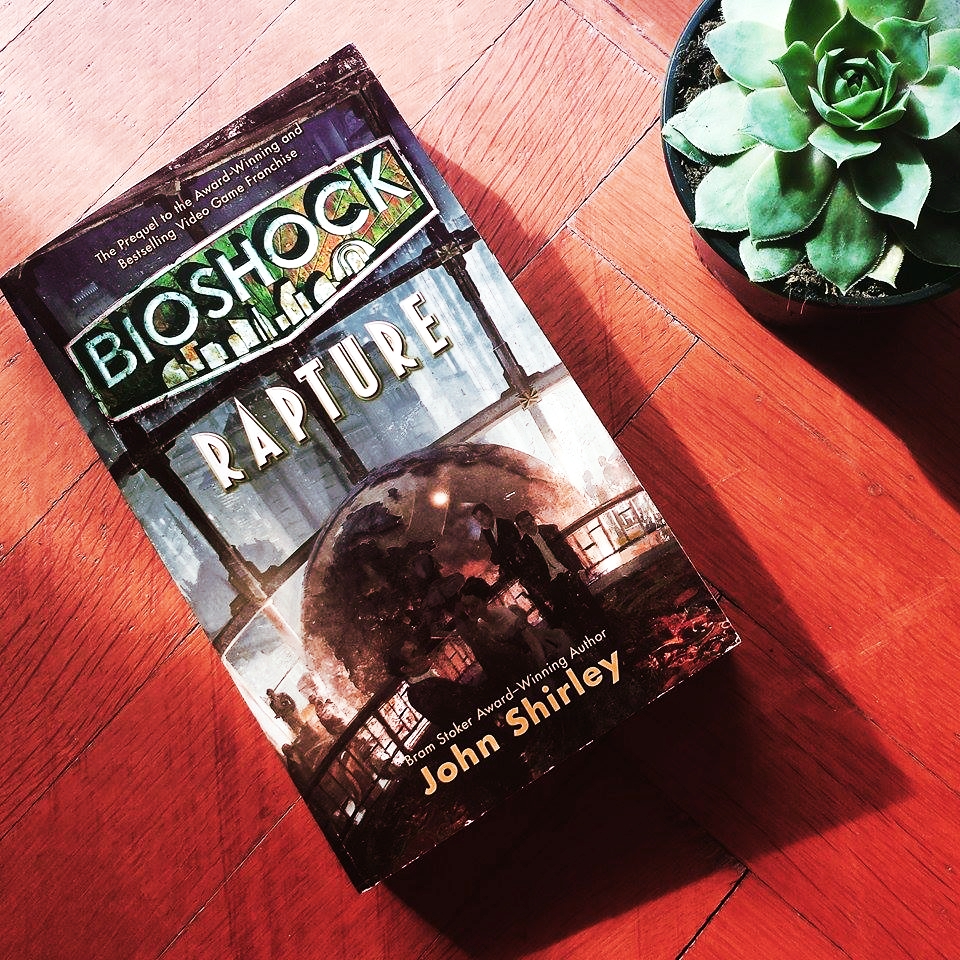
Spoilers ahead! Don’t read this review just yet if you haven’t played the game and don’t want major plot points to be revealed to you. Go play Bioshock (and maybe Bioshock 2) and come back later. Don’t worry, this review won’t go anywhere!
Ah, Rapture. How you terrify and intrigue me at the same time. A sprawling society under the sea may sound ridiculous to some (“A city at the bottom of the ocean? Ridiculous.“), but the one created in the 2007 video game Bioshock is nothing short of enchanting. And horrifying. If you’ve played the games like I recommended in my spoiler warning up above, you’ll know exactly what I’m talking about. John Shirley’s Rapture aims to add a little more backstory and clarifications of the first game, showing how one man’s idea became a deadly mess.
It’s not just a matter of procedure that I included that spoiler warning up above. Despite the book being a prequel to the games, they obviously expect you to either already know everything about the plot, or to not care about the story if you choose to play the game afterwards. Major plot twists are revealed in the book, meaning that anyone who thinks that it’s more logical to read the prequel before playing the game is going to be very underwhelmed at the ‘dun dun dun’ moments in Bioshock. “There ain’t no ‘Atlas’, kid, never was.” would definitely lose its impact if you know every detail about how ‘Atlas’ came to be.
Speaking of detail, one major issue I have with the book is the length. I understand that most people wouldn’t enjoy paying so much to get a smaller book, but this story did not need to be ~430 pages long. A lot of the book felt like padding, and even if those chapters were intended to flesh out the world of Rapture a little bit, it still felt like Mr. Shirley was getting paid by the word. I found myself getting bored at some points, which is never a good sign. However, in its defence, the book does do a good job of focusing more on minor characters, elevating characters from audio diary recorders to major players in the story, especially in the case of Bill McDonagh. Bill was basically just a corpse in the first Bioshock game, with a few of his audio diaries scattered around the city. We find out over the course of the book that he was usually the voice of reason in Rapture, and it was usually Andrew Ryan who needed that voice the most, whether he wanted to hear it or not. Bill’s way of seeing things so clearly ends up being his downfall, with Andrew Ryan’s stubborn nature, flawed ideals, and thirst for power stopping him from seeing what exactly Rapture had become, even when his ‘conscience’ told him.
But despite the fact that Bill is clearly the protagonist of the story, and one of the few interesting main characters since we know little about him from the game, it’s hard to get very invested in his personal story when the viewpoint changes so rapidly. In an effort to show everything that the game tells you over the course of many hours and audio diaries, we are constantly being put into someone else’s shoes, and beingh shown very clearly what they’re up to and thinking. While this does help tie in the game story to the book, it also often feels like the author was specifically told to include and spell out certain plot points, and it ends up feeling very unnatural at times.
Despite this book being a called a prequel to Bioshock, it doesn’t offer much more information than what we already know from the games. A few details and extra clarification help clear things up that may have previously been a little misunderstandable, but other than that the book doesn’t offer much new information. Knowing what Rapture will become also takes a little bit away from the suspense of the story – why bother caring when we already know how it’s going to end? I felt like the style was fitting and well-chosen, though, with the violence in certain action scenes in particular fitting the blunt brutality of the game well.
All in all, an enjoyable read, but not exactly a necessary one for those who have played the first Bioshock game already, and not one I’d recommend to anyone who hasn’t played the first game yet, because hello, spoilers. If you’re a big fan of the series who just wants to get their hands on everything Bioshock related, go ahead and get it if you have a few hours to spare and feel like getting inside Frank Fontaine’s head, but this isn’t a book I’ll be reading again. It’s a good book, but it’s not a great book, just another chance to dive deep into the world of Rapture once more.